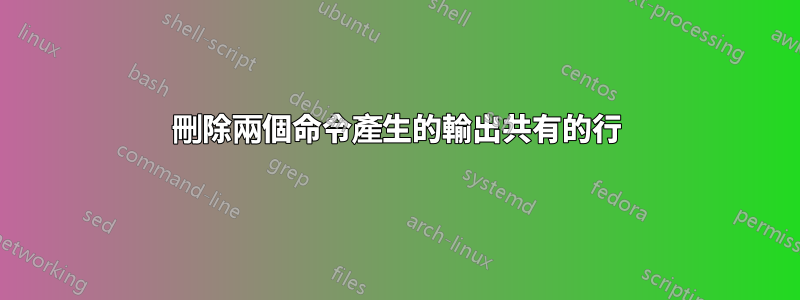
比如說,我有兩個回傳一些文字的命令。例如:
$ ./c1
/usr/bin/foo
/usr/bin/bar
/usr/bin/baz
$ ./c2
/usr/bin/foo
/usr/bin/qux
/usr/bin/buzz
/usr/bin/bar
我想刪除重複的行;即輸出將是(順序並不重要):
/usr/bin/baz
/usr/bin/qux
/usr/bin/buzz
我該怎麼做呢?
答案1
一個相當簡單的管道應該可以解決問題:
(./c1; ./c2) | sort -u
括號取得兩者的標準輸出./c1並./c2進入指令的標準輸入sort。此選項-u僅列印每組匹配行中的 1 個。
感謝 John WH Smith 注意到了簡化,並感謝 Bakuriu 的見解。
答案2
與comm來自GNU coreutils:
$ comm -3 <(sort -u <(./c1)) <(sort -u <(./c2)) | tr -d '\t'
/usr/bin/baz
/usr/bin/buzz
/usr/bin/qux
從man comm:
Compare sorted files FILE1 and FILE2 line by line.
With no options, produce three-column output. Column one contains
lines unique to FILE1, column two contains lines unique to FILE2, and
column three contains lines common to both files.
-1 suppress column 1 (lines unique to FILE1)
-2 suppress column 2 (lines unique to FILE2)
-3 suppress column 3 (lines that appear in both files)
答案3
awk-pipe 只讓第一次出現的輸入行通過:
( ./c1 ; ./c2 ) | awk '!u[$0]++'
這不需要時間進行排序,但需要記住所看到的行。因此,對於大量輸入sort,uniq可能會更好......
答案4
我建議利用它sed來解析文字並刪除重複的行。所以第一個指令保留重複行
sed '$!N; /^\(.*\)\n\1$/!P; D'
第二條指令將刪除重複項
sed -n 'G; s/\n/&&/; /^\([ -~]*\n\).*\n\1/d; s/\n//; h; P'


